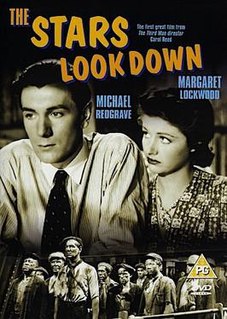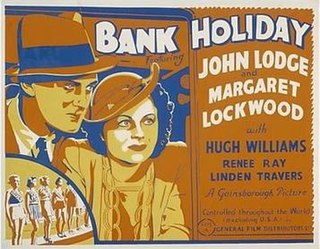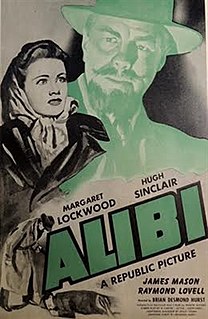
Margaret Lockwood, CBE, was an English actress. One of Britain's most popular film stars of the 1930s and 1940s, her film appearances included The Lady Vanishes (1938), Night Train to Munich (1940), The Man in Grey (1943), and The Wicked Lady (1945). She was nominated for the BAFTA Award for Best British Actress for the 1955 film Cast a Dark Shadow. She also starred in the television series Justice (1971–74).

A sister is a woman or a girl who shares one or more parents with another individual, a sibling. The male counterpart is a brother. Although the term typically refers to a familial relationship, it is sometimes used endearingly to refer to non-familial relationships. A full sister is a first degree relative.

The Stars Look Down is a British film from 1940, based on A. J. Cronin's 1935 novel of the same title, about injustices in a mining town in North East England. The film, co-scripted by Cronin and directed by Carol Reed, stars Michael Redgrave as Davey Fenwick and Margaret Lockwood as Jenny Sunley. The film is a New York Times Critics' Pick and is listed in The New York Times Guide to the Best 1,000 Movies Ever Made.

The Lieutenant is an American television series, the first created by Gene Roddenberry. It aired on NBC on Saturday evenings in the 1963–1964 television schedule. It was produced by Arena Productions, one of Metro-Goldwyn-Mayer's most successful in-house production companies of the 1960s. Situated at Camp Pendleton, the West Coast base of the U.S. Marine Corps, The Lieutenant focuses on the men of the Corps in peacetime with a Cold War backdrop. The title character is Second Lieutenant William Tiberius Rice, a rifle platoon leader and one of the training instructors at Camp Pendleton. An hour-long drama, The Lieutenant explores the lives of enlisted Marines and officers alike.

Julia Lockwood was a British actress. Daughter of Margaret Lockwood, her career began as a child actress at the age of four and spanned 30 years in film, television and the theatre.

Bank Holiday is a 1938 British drama film directed by Carol Reed and starring John Lodge, Margaret Lockwood, Hugh Williams and Kathleen Harrison.

Hungry Hill is a 1947 British film directed by Brian Desmond Hurst and starring Margaret Lockwood, Dennis Price, and Cecil Parker with a screenplay by Terence Young and Daphne du Maurier, from the 1943 novel by Daphne du Maurier.

Quiet Wedding is a 1941 British romantic comedy film directed by Anthony Asquith and starring Margaret Lockwood, Derek Farr and Marjorie Fielding. The screenplay was written by Terence Rattigan and Anatole de Grunwald based on the play Quiet Wedding by Esther McCracken. The film was remade in 1958 as Happy Is the Bride.

A Girl Must Live is a 1939 British romantic comedy film directed by Carol Reed that stars Margaret Lockwood, Renee Houston, Lilli Palmer, Hugh Sinclair, and Naunton Wayne. Based on a 1936 novel by Emery Bonett with the same title, the plot features three chorus line girls competing for the affection of a wealthy bachelor.

Trent's Last Case is a 1952 British detective film directed by Herbert Wilcox and starring Michael Wilding, Margaret Lockwood, Orson Welles and John McCallum. It was based on the 1913 novel Trent's Last Case by E. C. Bentley, and had been filmed previously in the UK with Clive Brook in 1920, and in a 1929 US version.

Trouble in the Glen is a 1954 British comedy film directed by Herbert Wilcox and starring Margaret Lockwood, Orson Welles, Forrest Tucker and Victor McLaglen. It is loosely based on Maurice Walsh's 1950 novel of the same name. It was filmed in Trucolor for Republic Pictures.

Dear Octopus is a 1943 British comedy film directed by Harold French and starring Margaret Lockwood, Michael Wilding and Celia Johnson. It is based on a 1938 play Dear Octopus written by Dodie Smith. It was also released as The Randolph Family.
Who's Your Lady Friend? is a 1937 British comedy film directed by Carol Reed and starring Frances Day, Vic Oliver and Betty Stockfeld. The secretary of a beauty specialist accidentally brings the wrong person back from the railway station, triggering a series of confusions. It was based on a comedy play by Bela Jenbach and Rudolf Österreicher, which had previously been made into an Austrian film The Gentleman Without a Residence three years earlier. It was an independent production made at Ealing Studios.

Alibi is a 1942 British mystery film directed by Brian Desmond Hurst and starring Margaret Lockwood, James Mason and Hugh Sinclair. It was based on the novel L'Alibi by Marcel Achard.

The Street Singer is a 1937 British musical film directed by Jean de Marguenat and starring Arthur Tracy, Margaret Lockwood and Arthur Riscoe. The screenplay concerns a famous musician who is mistaken for a street singer.

Justice is a British drama television series that originally aired on ITV in 39 hour-long episodes between 8 August 1971 and 16 October 1974. Margaret Lockwood stars as Harriet Peterson, a female barrister in the North of England. It was made by Yorkshire Television and was based loosely on Justice Is a Woman, an episode of ITV Playhouse broadcast in 1969 in which Lockwood had previously also played a barrister. The theme music was Crown Imperial by William Walton.
The Web is an American dramatic anthology series that aired live on CBS for four seasons from July 11, 1950 to September 26, 1954. The program was produced by Mark Goodson and Bill Todman, and was narrated by Jonathan Blake. A series with the same title and a similar premise was also broadcast briefly by NBC during the summer of 1957.
Pygmalion is a 1948 British TV production of the 1913 play by George Bernard Shaw. It was the first time the play was done for television and was the longest production done by the BBC to that time.
Ann Veronica is a 1952 British TV version of the 1909 H. G. Wells novel of the same name.














